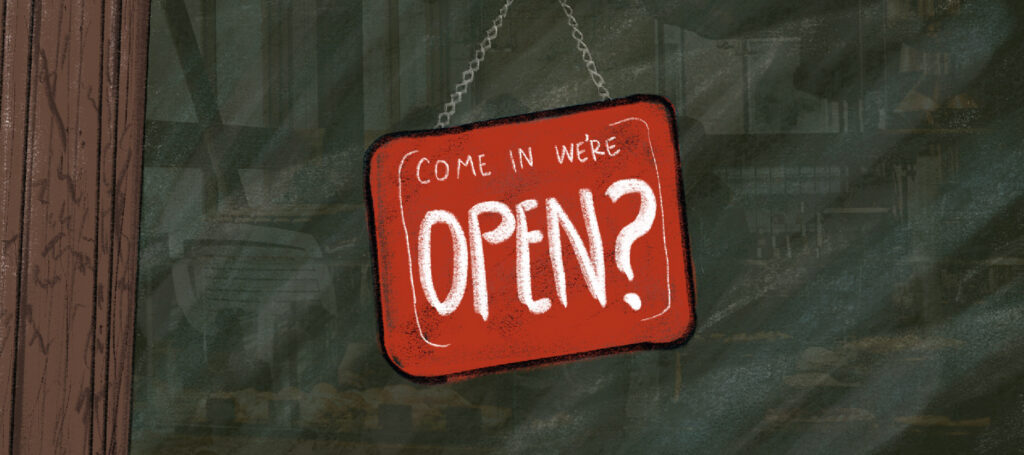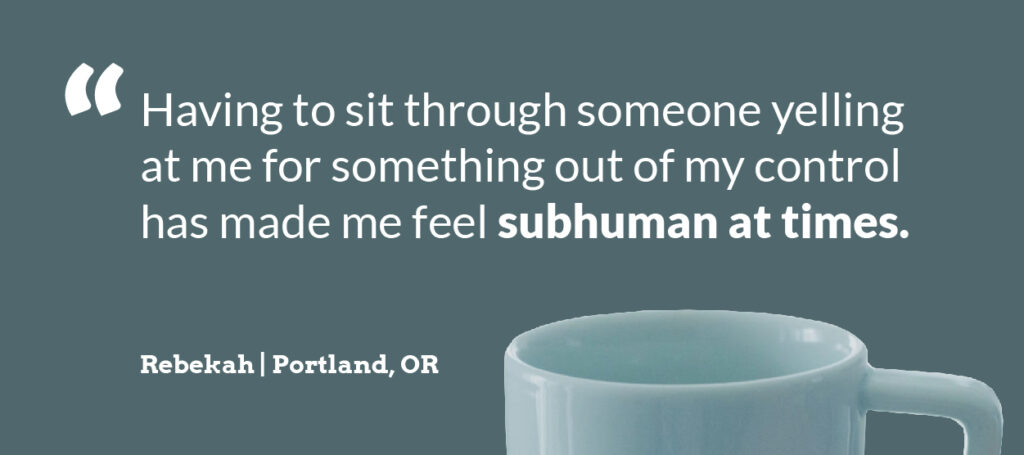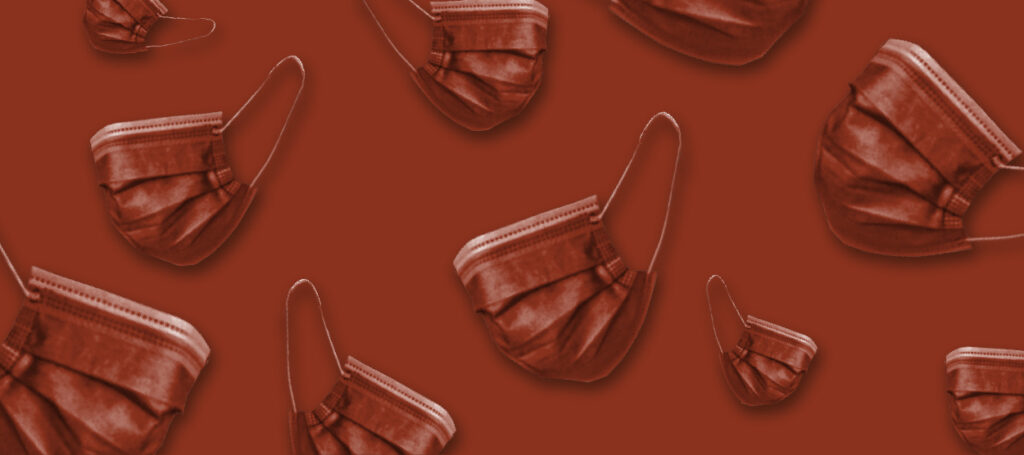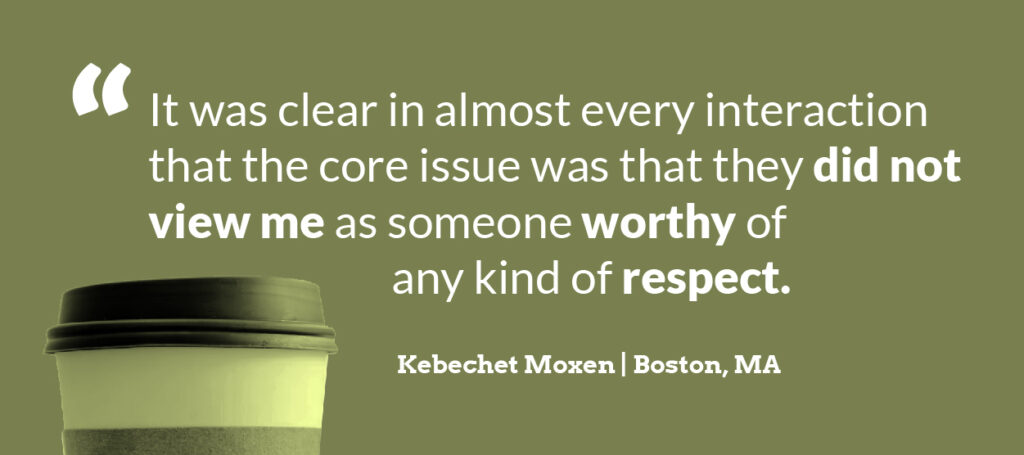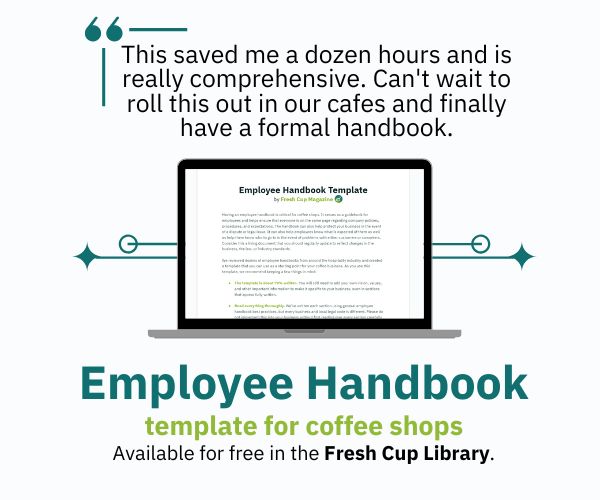Since the COVID-19 pandemic began in January 2020, workers at the retail level have been asked to carry a great burden. Many states imposed stay-at-home orders, exempting what the Centers for Disease Control and Prevention (CDC) dubbed essential workers. All workers who ensure consistent food supply chains were considered essential, including baristas.
Many cafés adjusted safety protocols throughout the pandemic, complying with varied and ever-shifting state and municipal regulations dictating cleanliness, capacity limits, and masking. As customer-facing employees, baristas faced regular harassment before the pandemic. Once the pandemic began and baristas remained on the front lines, they became the de facto enforcers of mask mandates, leading to increased hostility, resistance, and harassment from non-compliant customers.
Pre-Pandemic Dynamics Deepened During the Pandemic
A 2018 article from Harvard Business Review details some of the data on service worker harassment pre-pandemic. The numbers cited showed the restaurant industry as the epicenter of sexual harassment claims, with as many as 90% of women and 70% of men reported experiencing some form of sexual harassment.
The restaurant industry, coffee included, deals with a cultural legacy where the customer is always right. Reliance on tips can lead to entitled customers who know workers have little leverage against harassment. Workers who know they rely on tips for a large part of their wages may choose not to call out harassment. Whether workers earn the federal tipped minimum wage of $2.13 per hour or the federal minimum wage of $7.25 per hour, the minimum wage hasn’t risen in over a decade and is not enough to be the living wage in the US.
The restaurant industry workforce also skews younger, non-male, and otherwise marginalized along racial or gender lines, deepening power imbalances between front-line workers, customers, and upper management.
All of these issues were prevalent before the pandemic, and all deepened once the pandemic began. A 2020 article from NPR unpacks how workers relying on tips through the pandemic face elevated levels of harassment. At the time, a new report from One Fair Wage found that over 80% of workers saw a decline in tips, and over 40% reported an increase in sexual harassment from customers. Nearly 60% were reluctant about enforcing social distancing and mask use with customers they relied on for tips.
This data comes from the restaurant industry as a gestalt and can’t apply directly to cafés. But where facts fall short of conveying the lived experiences of baristas working through the pandemic, their stories speak volumes.
Beyond the Data: Real Worker Experiences
I talked to eight front-line baristas who worked through the pandemic; all reported elevated levels of harassment and hostility from customers, especially around masking. Anecdotes included debate and interrogation of safety policies, refusal to comply with stated policy, general hostility, slurs, and even spitting at or on workers. Many relayed feeling the fight/flight/freeze response from customer attacks (verbal or physical) and the anxiety and emotional drainage that follows. The chronic stress and emotional drain from repeated stressful incidents can also cause long- and short-term health issues.
“Customers would come in from the suburbs on the weekends and throw a fit,” says Jon Bailey, a café manager in Grand Rapids, Mich., who’s been working in coffee for nine years. “Call us nazis, fascists, they would call my POC employees slurs and leave 1-star reviews.” He encouraged staff to stand up for themselves, even if they needed to swear back in response.
For Katherine Gering, a former host based in Indianapolis, Ind., harassment incidents stick out: “I remember one guest dining outdoors, where masks were not required, who came inside to use the restroom. Staff stopped her and asked her to put on a mask, and she threw a fit like a toddler.” The customer didn’t have a mask in her possession, then tried to compromise by pulling her t-shirt over her mouth (not her nose). When staff attempted to enforce the need for an actual mask, “she got very angry and tried to argue with us that our policy was ridiculous,” says Gering.
Former barista and manager of New York City-based Everyman Espresso Samuel Lewontin has spent the last 21 years in coffee. Lewontin worked through the pandemic, and even though New York is generally regarded as progressive, he saw much of the same behavior. The experience of working with customers, even kind ones, became like a minefield. “It always felt like a roll of the dice engaging with folks who weren’t wearing masks; the chance that a given conversation might break bad made every conversation stressful.” He relayed a similar memory of a customer trying to use a t-shirt instead of a mask, then the customer getting in his face and yelling curses at him.
Rebekah (last name withheld for safety and privacy) works as a barista in Portland, OR. She’s faced a wide range of harassment due to mask policies. “I’ve been yelled at by adults for the simple question, ‘do you have a mask, or do you need me to provide one to you?’ Being yelled at is jarring and puts me into a fight, flight, or freeze, and since I can’t just leave my work, I usually end up feeling sick from having to deal with the emotions that come up from these situations.”
Management allowed her to refuse service, but then Rebekah had to deal with almost-guaranteed escalation when shutting down non-compliant customers. “Having to sit through someone yelling at me for something out of my control has made me feel subhuman at times.” She says it’s been a frustrating time that has affected her mental health and well-being. “I’m thankful I don’t have to enforce masking policies anymore, but I miss the protection of having everyone wear them,” she says.
St Louis-based former barista Katie B. (full last name withheld for safety and privacy) worked at a café that ran curbside service until mid-2021, then reopened indoor service with a mask requirement. “For a while, it was just me and the couple who owned the shop trying to keep the place afloat, which was stressful because we stayed busy,” she says. She was very anxious about COVID-19 and strict about social distancing.
Once the café reopened indoor service (without advance notice to staff), “most people would either comply with masking or walk out” once informed of the policy. But, she remembers having a man scream at the staff before being chased out by a manager. Even though most customers were compliant with the mask mandate, Katie said—just like Lewontin and Rebekah—that it “became exhausting to constantly ask people to put one on and then brace for potential fallout.”
Barista manager Max Moore of Columbus, OH, worked service for the entire pandemic. He witnessed a slate of hostile behaviors in response to the city-wide mask mandate ranging from people “acting completely unaware of a city-wide mandate to getting called slurs and cursed at.” He and staff have also had to call the police on hostile customers who wouldn’t leave. “When our shop officially reopened in August 2021 for dine-in, I’ve had conservatively 60% of people enter the shop without a mask—during a city-wide mask mandate,” he says, despite signs at the entrances.
GA (full name withheld for safety and privacy) has been in coffee for 13 years in New Orleans. The city’s stay-at-home order began in March 2020 after Mardi Gras led to a massive spike in COVID cases. In August 2020, when recorded cases had slightly decreased, their shop opened for window service with plexiglass on the door and masks required for walk-up service.
“I was spat at more than a handful of times, I had to replace the plexiglass twice from people punching it, had coffee thrown at me once, and the verbal abuse was constant,” they say. In March 2021, their café reopened masked indoor to-go ordering with a three-person capacity limit. After that, “People would refuse to mask, name-call, and leave bad reviews over mask requirements and vax card requirements that were city-mandated.” They eventually had to ban one daily regular after he threatened GA in front of their mother.
Their café fully reopened indoor dining at the end of March 2022—a few weeks after Mardi Gras—and they’re still receiving harassment from customers based on former store safety guidelines. “The harassment for previous rules keeps going as if people are stuck in some sort of time loop,” they say.
Working behind the bar in Boston, MA, Kebechet Moxen experienced persistent harassment from non-compliant customers. “I had a customer spit on me. I had two customers start screaming at each other in the store and nearly fight each other. For a good period of time, I would spend the beginning of [closing shifts]and my breaks crying because of how aggressive people got with me, and how often I had to ‘shut off’ my emotions in order to continue working.” Xe also says a group had to be banned from one location because they kept returning to start fights about masks.
Moxen added, “Almost every anti-mask person who escalated the interaction in the café had something to say about another aspect of my identity—my visible queerness, my disability, my autism, etc. It was clear in almost every interaction that the core issue was that they did not view me as someone worthy of any kind of respect.”
To Stay or Go
I asked how the experience of working through the pandemic affected the coffee workers’ desire to stay in coffee. At the time of our interview, Gering and Katie B. have left coffee, Rebekah plans to, and Moxen and Lewontin both plan to move away from front-of-house work, while GA, Max, and Jon are all motivated to stay in the industry.
“As soon as I felt like the café was back on its feet and fully staffed, I started applying for non-food service jobs and left last November,” says Katie B.
Gering had felt burnt out by the restaurant industry before COVID, but the pandemic definitely tipped the scale for her. “I do not regret leaving,” she says.
Moxen thought about finding something remote but ultimately stayed, “though plan to move into production work since I’ve become so burnt out on social interactions,” xe says.
Rebekah stepped away from her manager role to become a barista at Starbucks to access tuition reimbursement and go back to school to change careers. “It has actually been really exciting and motivating to me to know that I will not be working in service for the rest of my days,” she says.
Lewontin hasn’t left coffee, but he’s “called time” on guest-facing barista work. “I had already reached a point where it had become unsustainable for me personally, but the sustained stress of serving the public during the pandemic certainly didn’t help,” he says.
Moore loves working in coffee and the people in the Columbus coffee scene. “I don’t think I could ever leave,” he says, “but I watched as some of my favorite and most talented people left coffee for work-from-home gigs or somewhere they don’t have to interact with the general public.”
“My experience did not make me want to leave coffee. I dug my heels in and made coffee my main focus,” says GA. “The city was closed, and people were (and are) meaner than ever, so having an understanding employer and skill that I enjoy while being able to make money is probably the best-case scenario in a situation like this.” But, they say, they have become more reclusive and less trusting of people than before the pandemic. “I’m less likely to go out of my way to make that special connection with people. I definitely feel like I’ve aged in dog years, and my face shows it.”
Art by Marissa Youree
RJ Joseph is a coffee writer focusing primarily on equity, workers’ rights, and structural alternatives to the status quo. She’s been a barista, a roaster, a green coffee grader and lab tech, and finally made coffee writing her full-time gig at Red Fox Coffee Merchants. In her decade in coffee, she’s also run a queer coffee events organization, written a blog on equity in coffee, and run a coffee satire website called The Knockbox. If you see her around, say hi.


